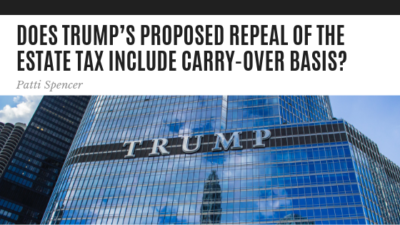Does Trump’s Proposed Repeal of the Estate Tax Include Carry-Over Basis?

According to Fortune, if the estate tax is repealed, the government won’t even feel it. The 2017 exemption is $5.49 million. The U.S. Census bureau estimates 2.7 million people will die in 2017, but only 11,000 of them will need to file estate tax returns and only about 5,200 will actually have to pay any estate tax.
In the past, whenever proposed legislation would repeal the estate tax, the legislation also included something called “carry-over basis.” That’s what happened in 2010. Now carry-over basis is something to be afraid of.
Since the purported Trump Tax Plan is only one page. It doesn’t mention carry-over basis.
The tax plan Trump floated in September 2016, would have repealed the estate tax, but applied a tax on capital gains held until death to recoup revenue with the first $10 million tax-free. Who knows what the current plan will provide.
The “basis” of a piece of property is generally the purchase price of that property and is used to calculate taxable gain (or loss) when the property is sold. The basis may be increased by improvement to the property or decreased by depreciation. In the case of stocks and bonds, the basis simply equals the purchase price, while with real estate the basis equals the purchase price plus the value of all capital improvements. The greater the increase in property value, the greater the taxable gain when sold.
In the past, when there was an estate tax, the basis of property acquired from a decedent was stepped up (or stepped down) to its date of death value. The basis step-up for property acquired from a decedent allowed individuals to transfer appreciated property to family members and others at death without the transferor, recipient or anyone else having to pay income tax on the pre-death appreciation. The policy behind the step-up was that it would be unfair to subject pre-death appreciation in assets to estate tax and then also to income tax, if and when the heir later sells.
If the estate tax is repealed, will the basis of property acquired from the decedent get a “step-up” in basis to date of death value? If not, the basis will carry-over, the same way it does for lifetime gifts.
Carry-over basis generally means the basis of inherited property remains the same as it was for the deceased owner; which potentially increases the amount of gain (and income tax) when the property is sold. What a mess. That means that in order to determine the basis, the executor will have to research the historical basis of assets – which is going to be extremely difficult since many people do not have records showing the acquisition cost of assets and the executor must value all assets as of the date of death. The basis in the hands of the beneficiary will be the lower of the two values.
If you cannot prove historical basis, the basis is assumed to be zero. That hurts.
Finding the historical basis of assets will be challenging. For example, stock with dividends reinvested gets a basis adjustment each time the dividends are reinvested. Basis changes when companies have been spun off from parent companies. For real estate, basis includes not only the initial acquisition cost, but also the cost of certain capital improvements. Many people are not aware of the basis in their property; and after their deaths, determining basis can be next to impossible.
